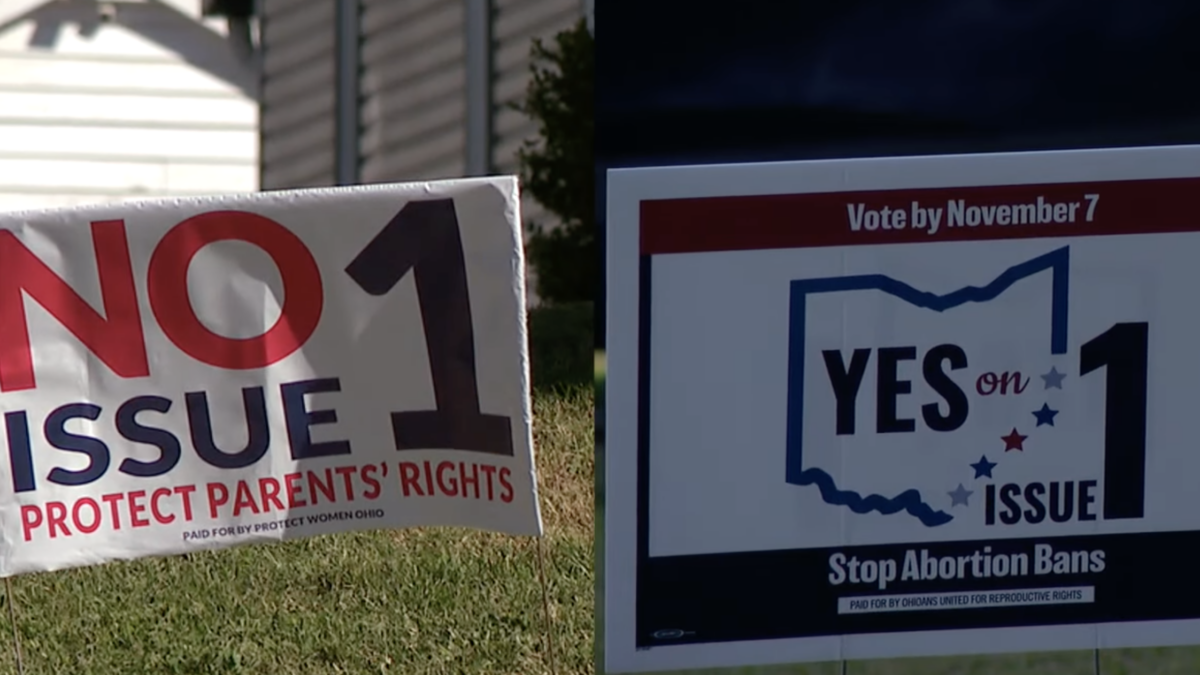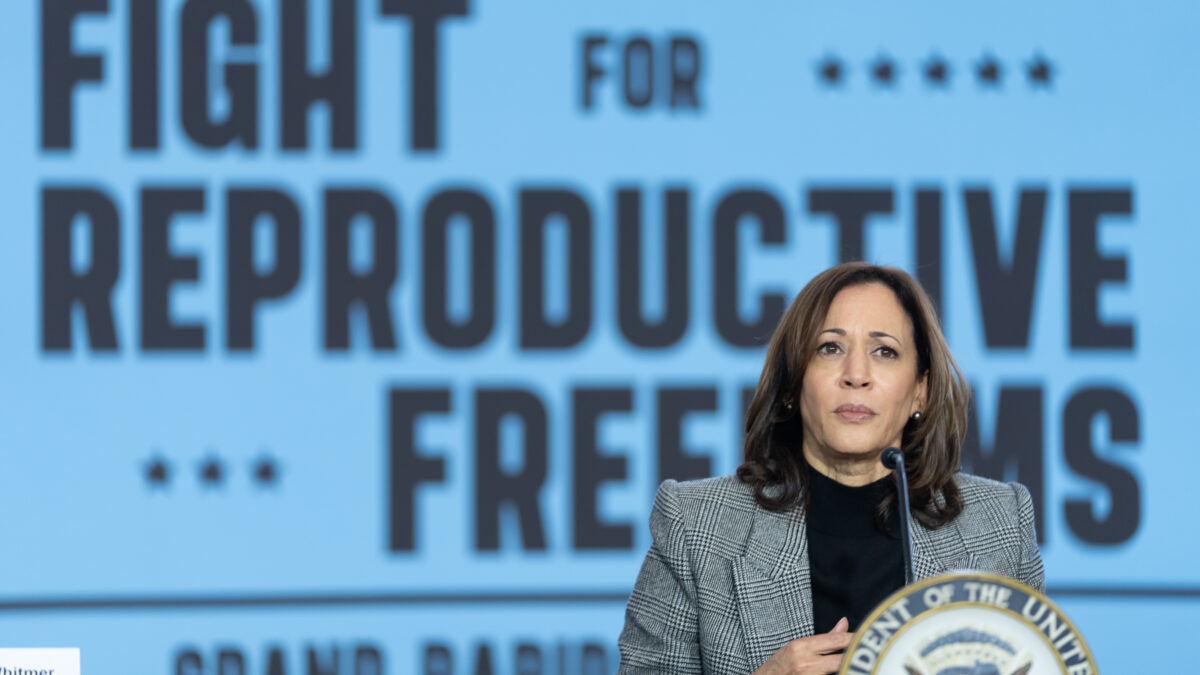With Tuesday’s relatively easy passage of an Ohio constitutional amendment that effectively bars that state’s legislature from regulating abortion in the state, abortion advocates are now convinced that they not only have the public on their side but have found political gold. They now view abortion as such a winning issue that they think it can pave the way to enacting a wide range of other leftist goals.
They are largely mistaken, as abortion mercifully remains a highly contentious issue in America. Still, abortion advocates will continue to prevail until pro-life leaders and politicians learn the political lessons that have arisen in the aftermath of their puzzling failure to prepare for a post-Roe world.
There are two main lessons to be learned from Ohio — and from other states where abortion advocates have scored recent victories. The first is that, as Abraham Lincoln understood, “public sentiment is everything” in a republic. One must win the argument before one can change the laws (or before one can keep them from changing in the wrong direction). And one cannot win the argument without being willing to make the argument.
The second is that a majority of Americans want limits on abortion, but they don’t want to eliminate it. They don’t want abortion on demand, but even less do they want an outright ban. After a half-century of legalized abortion imposed by activist judges, pro-lifers need to cultivate voters’ trust by emphasizing the need to limit rather than eliminate abortion, while emphasizing that pro-abortion advocates support abortion up until birth.
Lincoln’s own example is instructive. He regarded slavery as “a vast moral evil.” “Slavery is wrong,” he said, and “one cannot say that people have a right to do wrong” — yet he did not try to ban it in the South. He instead fought unflinchingly against its extension into the western territories and states. He fought the battle that could be won, not the one he was sure to lose.
Likewise, pro-lifers can’t win by trying to ban abortion outright or letting others suggest that this is their goal. Nor does it particularly serve pro-life interests to speak of banning abortion after a seemingly arbitrary number of weeks, severed from a rationale for that number. Not only does a 15-week abortion ban, the most popular new figure, concede too much — allowing abortions into the second trimester — but it also still requires a lot of political capital to try to enact. It is at once too much and too little. It may make sense in some places, but in general, it seems like a losing proposition. (Why the newfound fascination with weeks, anyway? Why not months, or days, or trimesters?)
Recognizing the importance of swaying public opinion, pro-lifers should instead seek to tie abortion bans to a developing child’s heartbeat or capacity for pain. They should push for requirements that mothers view ultrasounds before choosing whether to end their developing child’s life. They should defend crisis pregnancy centers against all sorts of attacks.
At the same time, as I’ve written before, pro-lifers should ask abortion supporters the uncomfortable question of where life begins. Is it at birth, as the Women’s Health Protection Act suggests? Is a developing child in the womb a human life? Is there any point before or perhaps even after birth when laws should prevent the killing of that life? These questions illuminate and mold public sentiment.
Exit polling provides evidence that Americans are in the center on abortion, as they favor policies involving banning or allowing abortion in “most cases” over those involving doing so in “all cases.” Both on Tuesday in Ohio and during last year’s midterm elections nationally, exit polling found that a majority of Americans think abortion should either be “legal in most cases” or “illegal in most cases.” In Ohio exit polling, 58 percent said they held one of those two positions, while in midterm exit polling, 56 percent of voters said so. In comparison, only 40 percent of voters in Ohio and 39 percent in last year’s midterms held a more absolutist position, saying either that abortion should be “legal in all cases” or “illegal in all cases.”
In the 2022 midterms, exit polling found that voters who held more middle-ground positions on abortion were a bit more inclined to say abortion should be “legal in most cases” (30 percent) than “illegal in most cases” (26 percent) — yet they voted for Republicans over Democrats by 15 percentage points (35 percent to 20 percent). That’s because the “illegal in most cases” group seemed to hold its beliefs with more conviction — 90 percent of them went Republican, according to exit polling, while just 60 percent of those who thought abortion should be “legal in most cases” went Democrat. So Republicans won among those with more middle-ground positions on abortion.
In Ohio, exit polling showed that voters who held more middle-ground positions split evenly on the proposed constitutional amendment (29 percent to 29 percent), while it passed by 13 points overall. It passed because more than twice as many voters held the (de facto Democrat) position that abortion should always be legal (28 percent) than held the position that abortion should always be illegal (12 percent). So among the more absolutist voters, pro-lifers are strongly outnumbered. This was true not only in Ohio in 2023 but nationally in 2022, when exit polling showed that voters who thought abortion should be “legal in all cases” outnumbered those who thought it should be “illegal in all cases” by a margin of 29 to 10 percent.
Even though most Americans are somewhat in the middle on this profound moral question, pro-abortion politicians are fully embracing the issue and portraying themselves as defenders of a woman’s “right to choose.” In comparison, pro-life politicians have been far more reticent about portraying themselves as defenders of a developing child’s right to live.
I reside in Virginia, where pro-abortion ads this election cycle were ubiquitous and pro-life ads were nonexistent. The impression surely left in many voters’ minds — because that’s what the ads said — is that pro-lifers want to ban all abortions. The fact that abortion advocates would generally allow all abortions — even partial-birth abortions — was left unsaid.
Americans’ general belief that there should be limits on abortion is at odds with the left’s view that abortion should be universally available. Pro-lifers are losing in spite of this, partly because they’re not making the case, and partly because Americans think pro-lifers want to ban all (or almost all) abortions. Americans are more concerned about abortion being eliminated, or nearly so, than they are about abortion advocates’ extreme embrace of abortion until birth (largely because voters don’t know about that).
As the refreshingly honest abortion advocate Camille Paglia puts it, “Abortion pits the stronger against the weaker, and only one survives.” Her words — highlighting the killing of the weak — starkly illustrate abortion’s cruel injustice. Perhaps because, on some level, she recognizes this injustice, Paglia says that while she favors “unrestricted access to abortion,” she nevertheless respects “the pro-life viewpoint” as the one that “has the moral high ground.”
In addition to holding that moral high ground, however, pro-lifers must learn to fight in the political trenches. Pro-lifers must work diligently to shift public opinion against abortion, but they neglect the current political reality at their — and abortion victims’ — peril.
Pro-lifers should follow the example set by Lincoln on an earlier, similarly contentious, issue. While not being shy about characterizing abortion as a moral evil, they should make clear that they are not proposing to ban the all-too-common practice across the board — for it is too well-established — even as their opponents are working diligently to allow it in all circumstances and at all times.
While recent defeats have been dispiriting to the pro-life cause, those determined to protect innocent human life should take heed from Lincoln’s words in his 1860 Cooper Union Address: “Let us have faith that right makes might.” By making their case more forcefully on the merits, while also demonstrating more political prudence and savvy, pro-life leaders and politicians could succeed in fulfilling the promise of Lincoln’s words.









